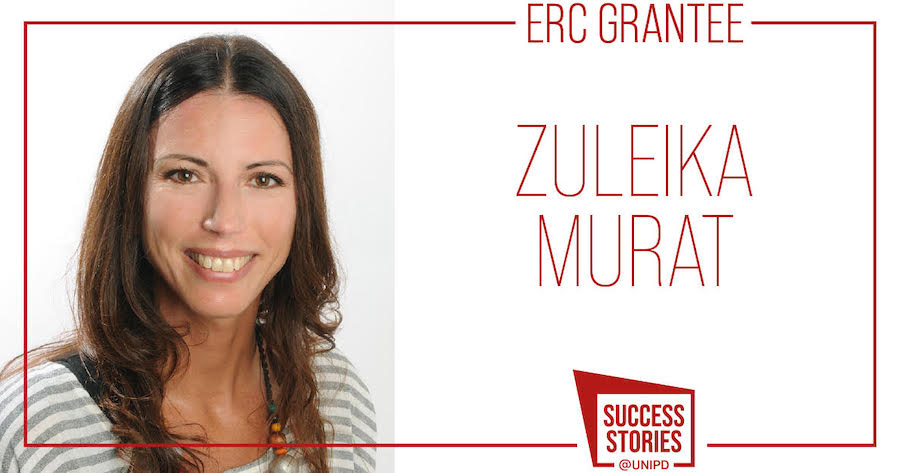
ERC Grantee: Zuleika Murat
...To the STARS and beyond!
Zuleika Murat has recently been awarded an ERC Starting Grant for her project SenSArt. But before that she also won the STARS Grant from the University of Padua.
“The preparation of the STARS proposal and the interview were perfect training ground for the preparation of my ERC proposal. Moreover, the STARS grant made me a much stronger candidate: having already been a PI, I presented my-self as an established and motivated scholar”.

Dr. Murat, in 2020 your project SenSArt was awarded an ERC Starting Grant. What is it about? And how did you approach the ERC project proposal?
Broadly speaking, the first step to approach an ERC proposal is finding an excellent, bottom-up idea. As for me, the very moment I got the idea occurred while I was working on wood reliquary caskets produced in 14th-century Venice. After reading a chronicle written in 1489 by a pilgrim who said that his devotional response was triggered by sensing the sweet smell that emanated from one of the caskets I was studying, I started asking myself whether I was using the right sense to grasp the meaning of these artworks (since I was just looking at them), to examine their agency, and to understand how Medieval worshippers experienced them.
Naturally, we cannot recreate today the kinds of experiences lived by worshippers in the Middle Ages. Still, we can reconstruct what Michael Baxandall calls “the period eye”: in his view, the combined examination of texts and objects provides the key to reconstruct the schemes that regulated the reception of art, allowing for a comprehension of medieval art as experienced by the beholders of the time. And this is basically what SenSArt aims to do: by establishing a multidisciplinary team of scholars to delve into texts on the senses and works of art, the project will lead to the reconstruction of the period sensorium, increasing our understanding of Medieval Europe.
In 2017 you also won a Unipd STARS grant with your project ILAPA. How does the STARS project work?
The STARS grants work in a similar way to the ERC grants, although their size is somewhat smaller: the projects’ duration is shorter, the budget is lower, and the number of team participants is reduced. That aside, the STARS and ERC grants share many similarities: both are characterized by funding schemes (Starting, Consolidator, etc.) and are based on the same criteria in terms of ground-breaking nature of the project, bottom-up approach, and multidisciplinary methodology. The application and selection procedures, including templates and final interview, are akin. In both schemes, PIs work independently, leading the research team, managing the budget, and organizing all project-related activities.
As for my STARS project, it worked very well. The University of Padua and my host department supported me and members of my team in the best possible way, providing us with facilities and administrative assistance for managing the grant.
Has the STARS grant helped you winning the ERC?
I think it has. Firstly, the preparation of the STARS proposal and the interview were perfect training ground for the preparation of my ERC proposal. Secondly, the STARS grant made me a much stronger candidate: having already been a PI, I presented my-self as an established and motivated scholar.
Also, I have gained experience in leading a multidisciplinary team of scholars, fostering the adoption of new methodologies, and managing the project budget. This experience has proved crucial in terms of building up my ERC proposal, with specific respect to the effective planning of work-packages, timescales, budget, and risk management.
What advice would you share with someone who is willing to compete for a STARS grant?
Firstly, I would suggest candidates to make sure that their research idea and CV are competitive for this scheme. In fact, STARS grants are designed for researchers who wish to carry out innovative, ambitious and independent projects; successful grantees are committed to submitting an ERC application with Padua as their host institution.
Secondly, read carefully the Call and the Guide for Applicants to understand the scheme, what is expected, and how to build up the proposal. Start familiarising yourself with the online submission process and the participant portal well in advance and start filling the application forms as soon as you can.
Set time aside to write and revise the application. Getting feedback from peers is important, so allow yourself time to get comments. Pay particular attention to the preparation of the budget according to the real needs of the project; timescales, workflow and work-packages are also important parts of the proposal and they need to be consistent with the methodology, the objectives, and the resources, so attention must be paid to the relevant sections.
Finally, submit your proposal a few hours in advance of the deadline.
International Research Office
via Martiri della libertà 8, 35137 Padova, Italy
tel. +39 049.827 1947 / 1948 / 1945
fax +39 049.827 1911
international.research@unipd.it


